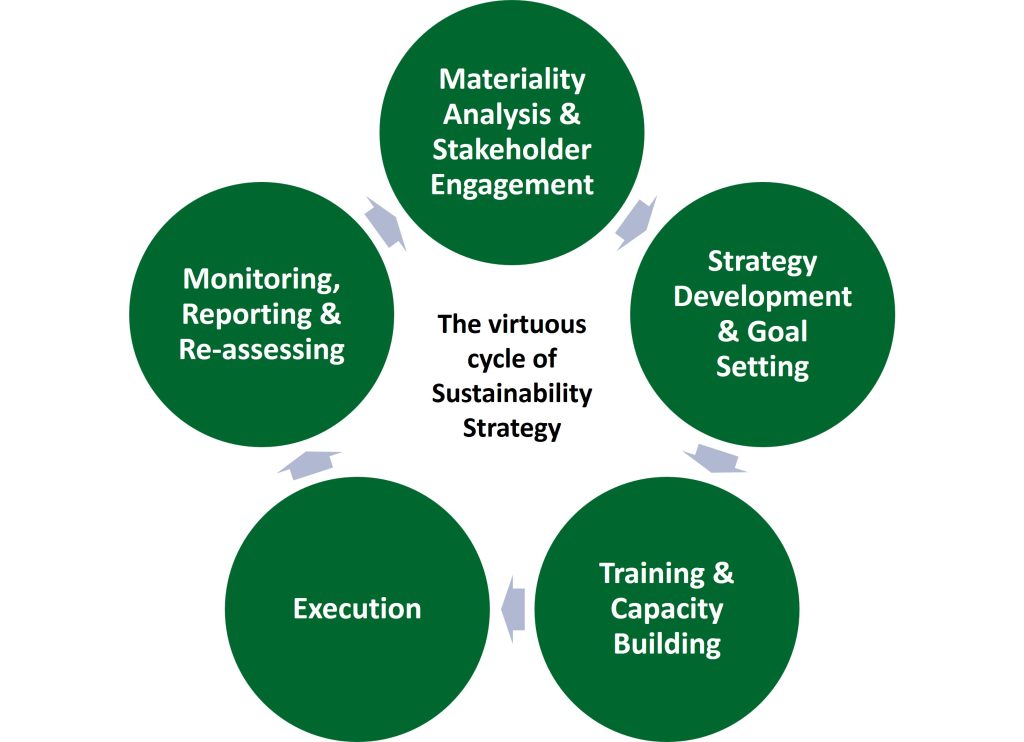Sustainability Strategy

Your sustainability strategy should help your company generate value while advancing environmental and social goals. Whether you’re a large corporation or a small business operating in any sector, our tailored approach to developing and implementing sustainability strategies can drive significant benefits for your organization.
Why Does it Matter?
A well-developed sustainability strategy serves as a roadmap for integrating environmental, social, and governance (ESG) principles into your business operations and decision-making processes. By aligning sustainability with your core business objectives, a robust strategy can help your company:
Enhance Operational Efficiency: Identify opportunities to reduce resource consumption, minimize waste, and optimize processes, leading to cost savings and improved productivity.
Build Resilience: Anticipate and address sustainability risks such as regulatory changes, supply chain disruptions, and reputational damage, enhancing business resilience and continuity.
Strengthen Stakeholder Relationships: Engage with customers, investors, employees, and communities to foster trust, loyalty, and long-term partnerships based on shared values and social responsibility.
Drive Innovation and Differentiation: Stimulate innovation by developing sustainable products, services, and business models that meet evolving market demands and regulatory requirements, providing a competitive edge in the marketplace.
Future-Proof Your Business: Position your company for long-term success and growth in a rapidly changing business landscape shaped by environmental challenges, social inequalities, and shifting stakeholder expectations.
Our approach
At xESG, we follow a systematic approach to develop and implement sustainability strategies tailored to the unique needs and goals of each client. Our process is usually based on a virtuous cycle of improvement:

Materiality Analysis & Stakeholder Engagement: Identify and prioritize key sustainability issues based on stakeholder expectations, regulatory requirements, and potential impacts on your business. Engage with internal and external stakeholders to gain insights and build consensus on strategic priorities.
Strategy Development & Goal Setting: Develop a customized sustainability strategy with a comprehensive set of initiatives and action plans to address identified priorities and achieve established goals. Define roles, responsibilities, timelines, and performance metrics to ensure effective implementation and monitoring.
Training & Capacity Building: Build internal capacity and awareness by providing training and guidance to employees, suppliers, and partners on sustainability principles, practices, and tools. Foster a culture of sustainability throughout your organization, empowering stakeholders to contribute to strategy execution and performance improvement.
Execution: Effectively execute the sustainability strategy by launching the planned initiatives and action plans. Ensure that all projects are aligned with the strategic goals and are managed according to the predefined timelines and responsibilities. Utilize cross-functional teams to facilitate project implementation, overcoming potential barriers through proactive problem-solving and adaptive management. Regularly review progress against milestones and performance metrics, adjusting tactics as needed to enhance outcomes. Engage continually with stakeholders to ensure alignment and to integrate their feedback into ongoing operations, thereby maintaining momentum and commitment to the sustainability objectives.
Monitoring, Reporting & Re-assessing: Establish robust monitoring and reporting mechanisms to track progress towards sustainability goals, measure performance against targets, and transparently communicate outcomes to stakeholders. Continuously evaluate the effectiveness of strategies, identify areas for improvement, and adapt the sustainability strategy to evolving challenges and opportunities.
Need help developing or enhancing your sustainability strategy?
